Cat Rambo's Blog, page 25
March 11, 2019
Guest Post: Score One for Music by B. Morris Allen Editor, Metaphorosis Books and Metaphorosis Magazine
What if prose were written like music? What if, instead, of a common world, stories in an anthology were steps on a share emotional path? Those are the questions the upcoming anthology Score is attempting to answer.
Emotions are a key part of our experience of art. The books that stick with you are often the ones that made you feel something. Even when we don’t recall the details of a plot (or painting, or movie), we’ll often recall how it made us feel. Even if you don’t recall the details of Watership Down, for example -— the names of the rabbits, the original warren, etc. — you probably remember how you felt about the rabbits and what happened to them. You remember how you felt when you closed the book. Even if you mislay every detail of a book, you’ll remember whether it made you laugh or cry or feel wistful.
Score is an attempt to tackle the emotional side of writing head on. A group of almost 20 authors set out not to write about robots or aliens or magic — though we have all of those — but to write from emotion.
What does that mean, and how does it work? It means, simply, that each of the authors worked from a coherent emotional score, knowing the emotions in the piece before and after theirs, what emotions they were to emphasize, and … nothing else. They had complete freedom of genre, topic, tone, approach, etc. — so long as they worked with the emotions they were assigned. The result is a fascinating collection of stories with a distinct emotional progression.
Putting together the score was challenging. As the editor and ‘composer’, I defined fairly early on the emotions we would work with. I knew the direction I wanted to score to take – an overall path of ascending hope that I thought a good fit to the times — but choosing emotional terminology that would work consistently across many different writers took some work.
In the end, we worked from a palette of six emotional ranges – six emotions with four variants each, two positive, two negative. For example, Hope ranges from Hope at the positive end to Despair at the negative end. These aren’t quite the emotional pairs used by social scientists, and we could have ended up with a wide range of others, but these six emotional ranges allowed ample scope for ups and downs. The emotions are loosely grouped into two sets – the Hope set (Hope, Curiosity, Awe) and the Joy set (Joy, Love, Lust).
Each writer was assigned a specific major and minor emotion, and the score has distinct movements. Using musical terms very approximately, there’s an Overture, a Hope triad, a Joy triad, a Bridge, a Joy triad inversion, a Hope triad inversion, and a Coda. There are high points and low points, but … spoiler alert… it all ends with Hope and Joy.
It’s been a lot of fun putting this together. While I personally often write from an emotional basis, putting together an entire score was an intriguing and challenging exercise. Each writer interpreted the task in their own way, putting their own distinct stamp on it, as artists will. The result is intriguing, and I hope will be as much of an adventure for readers as it was for all of us.
Score: an SFF symphony is out on March 2nd from Metaphorosis Books.
Enjoy this writing advice and want more content like it? Check out the classes Cat gives via the Rambo Academy for Wayward Writers, which offers both on-demand and live online writing classes for fantasy and science fiction writers from Cat and other authors, including Ann Leckie, Seanan McGuire, Fran Wilde and other talents! All classes include three free slots.
If you’re an author or other fantasy and science fiction creative, and want to do a guest blog post, please check out the guest blog post guidelines.
March 5, 2019
March Recent Efforts
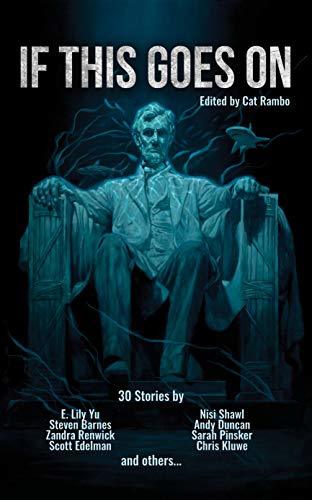 It’s March, and you can now get IF THIS GOES ON, the anthology of near future political science fiction that I edited. There are some amazing stories in it, and I’m so proud of how the book turned out. Please check it out, and if you enjoy it, spread the word with a review or mention!
It’s March, and you can now get IF THIS GOES ON, the anthology of near future political science fiction that I edited. There are some amazing stories in it, and I’m so proud of how the book turned out. Please check it out, and if you enjoy it, spread the word with a review or mention!
The project was initially the idea of publisher Colin Coyle; it was a pleasure working with him along with an awesome team of slush readers. The book was a mix of solicited stories along with ones that came in through the slush pile, so there’s a nice mix of more established and newer voices.
Some of the authors are friends as well, including E. Lily Yu, who I first met working with Fantasy Magazine and whose lovely “Green Glass: A Love Story” leads off the collection in a way that is beautiful and disturbing. The stories are sad and funny, often biting. Sometimes the worlds they project are just a heartbeat away; other times they are surreal glimmers that show us the distortions in our own existence and interactions with the world.
All of them are political — some more subtle than others, certainly — but this project declares itself from page one to be about politics in this country and the world at large.
In related news, I’ve also curated another Storybundle for Women’s History month, the second Feminist Futures one. You can find it here: I’m very happy with this, which ended up being nicely diverse, plus let me put forth K.C. Ball’s collection, SNAPSHOTS FROM A BLACK HOLE AND OTHER STORIES. K.C. was a friend and I edited the collection. She also edited the flash magazine TEN FLASH, which published my flash piece, “Lost in Drowsy Dreams.”
Grab the bundle now – it’s only good for a few weeks, and it has some really terrific reads in it!
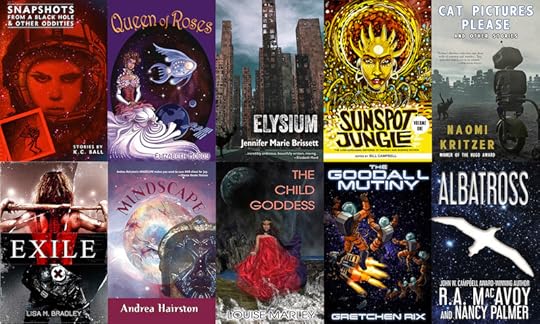
Several new classes have been added to the Rambo Academy for Wayward Writers schedule, including this weekend’s live online class Mapping the Labyrinth: Plotting Your Novel So Things Happen. I’ve co-taught with Kay several times, and she is a savvy and elegant woman. I’m anticipating learning things from the class myself.
Other upcoming classes being taught for the first time are The Fashion of Worldbuilding: Clothes, Technology, and Taboos with Mary Robinette Kowal and Catherine Lundoff’s In Flagrante Delicto: Writing Effective Sex Scenes and So You Want to Put Together An Anthology?. You can find the full list of live online writing classes here; look for several more getting added this month.
In 2020, Meerkat Press launches Meerkat Shorts, a novelette and novella line, and my “Carpe Glitter” will be part of the initial line-up, along with “Into Bones Like Oil” by Kaaron Warren and “Wild Horse” by Kyle Richardson. “Carpe Glitter” is the story of a woman sorting through the masses of stuff accumulated by her grandmother, a retired stage magician, who runs across something very strange indeed.

Chez Rambo has moved! And one feature of the new place is a much quieter space for podcasting, where there’s not a fire engine whirling by or a recycling truck picking up an apartment building’s worth of trash or similar Very Noisy Events happening every half hour. Here’s two recent additions to the Youtube channel: How to Send Out Stories and How to Evaluate Markets. Got something you want explored in a future video? Drop me a line in the comments here.
I’ve confirmed I’ll be at the Bard’s Tower at Emerald City Comic Con this month. I’ll post a schedule of when I’ll be at the booth, but my plan is to spend most of my time there, since it’s so much fun hanging out with those awesome folks. If you’re going to be there, please stop by and say hi!
On March 14, I’m part of the People Eat and Give fundraising event for the excellent nonprofit the Bureau of Fearless Ideas, a nonprofit writing and communications program that provides after school tutoring, workshops, and other efforts to “prepare young people, ages 6 to 18, for a successful future by developing strong writing skills, championing diverse communication styles, and motivating young people to share their stories.” I’m part of the skit the kids have written and are putting on; we’ve got our first rehearsal this weekend!
There’s an event for Unfettered III: Tales by Masters of Fantasy, which has my story, “Merchants Have Maxims,” in it on Tuesday, March 19, at 7 PM. I’ll be there signing along with several of the other authors as well as its editor Shawn Speakman.
March 4, 2019
Guest Post: RecipeArium by Costi Gurgu
GOURMET RECIPE: VERMIH IN PLABOS SAUCE
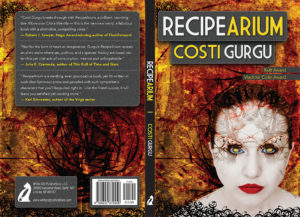 There are three complementary sides that determine a phril personality: gastronomy, politics, and romance. The rest represents salads or pickles to fill the mundane.
There are three complementary sides that determine a phril personality: gastronomy, politics, and romance. The rest represents salads or pickles to fill the mundane.
I will start naturally, with food for the gourmet side of the phrilic spirit, presenting to you, my dear reader, an absolutely genuine Recipe.
INGREDIENTS:
Mature vermih –a crawler from the land-worm family, having its vital organ—the sufleida—in the middle of its spindle-shaped body. This in turn is protected by a circular stomach layer, where the ingested food is stored, preparatory to being assimilated after fermentation.
Swamp Plabos Sauce–for plant and insect broths, in a suckitori base.
Sequ-tulapa flavoured oil – with hot spices, preferably from Blood-Moth’s wings.
PREPARATION:
The fragrant vermih should be left to rot alive only under the light of the Three Daughters of the Sky. The diffuse light drives it mad and the cool night air makes its stomach layer tremble. The trembling forces its membrane to enlarge to several times its usual size, preparing for future storage. If it doesn’t scream for mercy, it means it has not putrefied enough. However, while it is rotting, ensure it is protected from fright, to avoid wrinkling its flesh.
When it has reached the desired level of putrefaction, immediately place the gluttonous and shivering animal on the sweet maidenly leaf of the moamoam. The two beings will intertwine and the juice of pleasure will flow from the vermih, imbuing the fluffy layer of the maiden moamoam. The vermih, driven by overwhelming hunger, will then devour the leaf. Because its stomach membrane is enlarged, it will not be satisfied with only one leaf. Continue this process with another leaf, luring it by way of the gnawed stem to where the Swamp Plabos Sauce boils vigorously. I have specified that the sauce be flavoured with suckitori. The steam from the boiling sauce will penetrate the vermih’s stomach wall, moistening the ingested moamoam leaves before the vermih throws itself into the sauce, simultaneously ejecting one last fresh spurt of the bittersweet pleasure liquid.
The vermih will sink to the bottom of the pot of boiling sauce, allowing the Plabos liquor to penetrate it just short of its core. It is very important that the depth the crawler will sink and the thickness of the sauce be calculated exactly. Otherwise, the slightest contamination of its vital core with the liquor will cause a hideous death, which would thicken the vermih’s flesh.
As its stomach membrane tenderizes to a suitable degree of sponginess, and with its flesh flavoured by the Swamp Plabos Sauce, the crawler should fall free from the orifice in the pot’s bottom straight onto your plate, where it will spread into a well-blended and sparkling stew surrounding the sufleida, still pulsing within the protective layer of the bitter crystalline coating.
Combine the sequ-tulapa flavoured oil with hot spices, preferably brown butterfly wings, and heat it to boiling. Pour the hot oil over the crystalline coating of the sufleida. This will melt the covering and evaporate all trace of bitterness. Flavour to taste with a sprinkling of Night Daughters Flower pollen and serve with red wine for a truly gourmet meal.
(from The Gastronomic Teachingsof Master Recipear Plabos)
Costi’s scripts have been finalists and semifinalists in numerous competitions. 
Costi’s fiction has appeared in Canada, the United States, and Europe. He has sold 3 books and over 50 stories for which he has won 24 awards. His latest sales include the anthologies Tesseracts 17, The Mammoth Book of Dieselpunk, Dark Horizons, Street Magick, Water, and Alice Unbound. His story Cosmoboticawas a finalist for Aurora Awards.
His novel RecipeArium is out from White Cat Publications and a 2018 finalist for the Aurora Awards.
To find out more about Costi Gurgu visit www.costigurgu.com
Recently, Costi started Games for Aliens, a tabletop games enterprise. His first two games are Absolutism (a dystopian scenario) and Carami (based on RecipeArium).
Enjoy this writing advice and want more content like it? Check out the classes Cat gives via the Rambo Academy for Wayward Writers, which offers both on-demand and live online writing classes for fantasy and science fiction writers from Cat and other authors, including Ann Leckie, Seanan McGuire, Fran Wilde and other talents! All classes include three free slots.
If you’re an author or other fantasy and science fiction creative, and want to do a guest blog post, please check out the guest blog post guidelines
February 5, 2019
Guest Post: Happy Endings by Awesomewriter65
So, as a middle schooler, I thought that Awesomewriter65 would be the perfect username for my Wattpad. I had then started writing Happy Endings.
This story was practically my baby. I worked out ever single detail I could and planned it to the tee. Even though I have everything for it planned, I still have not finished my entire novel. I have been rewriting, revising and planning this entire universe since I was in the sixth grade. 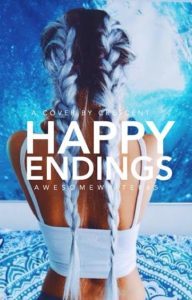
Cover made for me by a fellow writer on Wattpad.
Since publishing chapters of Happy Endings on Wattpad, so far I have gathered over 1k in views. In honor of the many years I have been posting chapters of Happy Endings, I thought I’d share with you my favorite scene from Happy Endings.
Before I share the excerpt, I should probably tell you what my story is about. This summary was pulled from my Wattpad account:
Another cover made by a fellow writer on Wattpad.
“Life hits Rebecca Waters and Philip Waters in the face when their mom gets thrown in prison. With their mom in prison and their dad gone their older brother Eddie takes them in. Growing up with a drug dealing mom was hard enough, but after the arrest it was even harder being raised by their brother who was still growing up himself despite his age.Over the years once the kids watched as their older brother grew up from a rebellious teenager to a loving husband with a stable job and a baby. One mishap; their mother is released from prison on good behavior and is ready to fight for custody.
If that can’t get any worse, Rebecca struggles with the idea of falling in love and the drama of high school. Thankfully Phil and Rebecca have their best friends to stick besides beside them. But when things start to look up, it all falls down. The twins’ mom hires scheming lawyer Shane Russo to plead their case and let their mom win. As he gets close to Rebecca and her weird family, Shane soon learns that he suddenly cares for this family which makes the battle even harder. Not only that, but Shane deals with his own inner demons.
Will they be able to stick together?”
Now, the following is an interaction between the lawyer, Shane, and the twins’ sister-in-law, Angie. If you have any interest in reading more, follow my Wattpad page and check out my posts there.
Yet, another amazing cover made by another member of the Wattpad community.
“Shane stayed in a dirty motel a few blocks away from a few restaurants. This was his first custody case. Shane mostly worked with cases in which someone sued someone else. The only thing he hoped for is not bonding with the twins. That would be horrible. He was hired by the twins’ mom to represent them, but somehow let their mom win. For the sake of the case, and for the sake of him getting his money, he had to let their mom win and had to not get attached to the two teens.
As he threw his clothes in the dirty dresser that smelled like mold, he hoped the dresser wouldn’t ruin his clothes. The room was dark and dusty. There was one bed and a dresser and a square T.V. There was a bathroom, a small one at that. The room was quiet. It was almost too quiet. He could hear his own heart beat. It was a nervous heartbeat. It was a guilty heartbeat. The kind of heartbeat you get after someone gets furious with you and you’re afraid they’ll never forgive you.
All he had left in his brown matted up suitcase was a couple of black shirts and some socks. He shook, startled when he heard a knock at his room door. Shane stood silently hoping the knocking would go away and he could watch T.V. His body was like a deer when it sees headlights. Only fear pumped his blood. The knocking soon turned into banging and he gave in and slowly walked to open the door. When he opened the door, he saw a short British woman with dark red hair crossing her arms. Her arms were crossed and anger spread across her face.
Shane put on a fake face to hide his fear. ‘Hey, dollface,’ He said to her. ‘How ya doin’?’
Angela jabbed her pointer finger at Shane’s chest yelling, ‘You’re a fraud!’ She backed him up into the room and slammed the door behind her.
Shane crossed his arms, ‘What in the world are you on about?’ He snapped.
‘What am I on about? Don’t act like you don’t know,’ she replied in a irritated voice.
Shane threw his hands in the air. ‘Well if I’m an actor, you might as well give me an Oscar!’ He replied sarcastically in an almost shouting voice.
He tried to ignore Angela so he walked his way to the mini fridge in his motel. Angie still stood, silently judging him. Angela knows how to get information outta of people. She does it for a living. She can flash the opposing side in a courtroom a look and she can get the information out of people.
Angela is an honest person. She doesn’t believe in lying and she can sniff it out a liar from miles away.
‘Shane Russo, don’t you dare mess with me. I uncovered all your dirty little secrets.’
Shane stopped in his tracks as he opened the bottle of beer.
‘What do you know about me?’ His voice shook as he turned around to face her. He tried the best he could to as stay calm as he could, but in that moment it was hard to stay calm.
‘You’re just another sleazy lawyer!’ she accused.
‘I wouldn’t know what you’re talking about,’ He replied sipping his beer.
‘I have a very good friend who can dig up so much dirt about you. You may have Rebecca and Phil and maybe even Eddie a little, but I could see right through your ignorant smug look. I don’t trust you.’
Shane rolled his eyes at her. ‘Oh yeah?’ He tested.
‘You act like women don’t know how to do their research,’ Angie muttered under her breath.
Shane kept rolling his eyes at her. This whole conversation was like arguing with his siblings. The other one will just keep badgering him until he finally tells the truth. He didn’t want to give in, but if there is one thing he hates more than waking up before noon, it’s someone like Angie.
Granted, he knew what he was walking into when he signed up for this job. Laura gave him information of the family. Shane already knew what he needed to know. It was just a matter of time before he could put everything into action and do what he does best. 
One last awesome cover made for me by someone on Wattpad.
‘How’d you even find anything on me?’ Shane sighed giving in as he rubbed his temples. ‘Fine! You want the truth? I lie, okay? I bribe people and I do illegal things. And I like it.’
Angela was stunned and wide eyed. ‘I can’t believe you! How could you do that?’
Shane stifled a sarcastic laugh. ‘Look, dollface. There are two kinds of people out there. There are the Saints who want to do everything right. Then there are liars and I’m one of them.’
She pinched the bridge of her nose. ‘God, you’re horrible. I can’t believe I breathe the same air as you.’
Shane downed the rest of his beer he had been drinking and threw it in the trash can. He watched her as she circled the room, trying to wrap her head around the situation. Angela quickly tried thinking of solutions to fix the problem.
It seemed like everyone had goggles on in the house. They all thought this guy was their savior. To Angie, he was translucent and she could see right through him. She was even surprised that Phil and Eddie fell for Shane’s act.
‘You act like you do nothing wrong. You’re a sleaze and a scammer. I can’t believe that people like you exist—’
He pointed his finger at her, cutting her off and shouting, ‘You don’t know what it’s like for me. When I first started out I broke and I needed the cash. It’s easy to throw a little bribe here and there.’
Her hands ran through her red hair. ‘Everyone starts off at the bottom, Shane! It would’ve been fine if you just played fair! You didn’t have to base your cases off lies and bribes!’
‘You’re a lawyer too! You should know that we’re professional liars!’
‘We serve for justice. We can’t just feed lies. We need cold hard facts. Why’d you even take this case?’
She seemed more calm than before, but now she was more sad than angry, ‘Why’d you even take this case? Because their mom offered you a lot of money? I can see you need it.’ She looked around at the grimy hotel room.
‘Okay, yes she gave me money to fight in this custody case and yes I may be living in a crappy motel room. Sure, I’m broke at this moment in time, but I’m not who I was back then.’
Angela scoffed at this and rolled her eyes. She had every right to. She doubted that he was any different now. The reason he was broke is because he blows all his money. Mostly on gambling and drinking. The reason he took this job was because to him, it seemed like the perfect job for him. It was different and seemed easy enough where he could pass with flying colors. Plus, these days it seems like people love seeing children reunited with their biological mother.
‘But I’m also doing this because I really want to do this, and do something good for these kids,’ Shane lied and Angela just rolled her eyes. She could see right through this guy. She no idea why anyone would trust this him.
Must be his good looks, Angela thought to herself.
‘Listen here Shane Russo, these kids mean the world to Eddie. I’m pretty sure he loves them more than he loves himself. If I could, I’d be the lawyer in this case but I’m not,’ She walked up to him and stabbed his chest with her finger again.
‘He waited so long to get them back in his life and if you mess anything up for this family I will make sure that every detail I have on you is released to the public.’
Shane stopped in his tracks and stared at the short woman walking to the door, ‘So let me get this straight. You’re not okay with lying, but you’re okay with blackmailing me?’
Angela turned around before she walked out the door. She turned back about to speak again but only stared for a good few seconds at the middle-aged man. Then she shook her head and left. Shane watched her get in her car. He watched until she drove away.”
Lou is a writer of rom coms, eater of pizza, lover of 90s boybands and cat enthusiast. You can follow her on Twitter at @aweosmewriter.
February 4, 2019
Chez Rambo Reading, January 2019
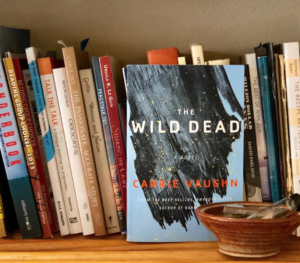 I’m tracking my reading on a monthly basis again as part of 2019’s effort to be more methodical about record keeping. So here’s what i read, along with some notes on it, as i start building up in order to be doing more regular lengthy reviews again.
I’m tracking my reading on a monthly basis again as part of 2019’s effort to be more methodical about record keeping. So here’s what i read, along with some notes on it, as i start building up in order to be doing more regular lengthy reviews again.
I have been binge-reading Robert J. Crane’s Out of the Box series and finished up Badder, Nemesis, Apex, Time, Remember, Hero, and Flashback. These are highly satisfying superhero novels and I’m really looking forward to the next installment, which is book #24.
I also tried to add more nonfiction to my reading list in 2019. The first of these was Seth Godin’s This is Marketing: You Can’t Be Seen Until You Learn to See, which I found myself taking a lot of notes on. I’ve been reading a number of works on marketing and pricing for the Rambo Academy and it’s been handy but right now I feel like I have been slogging through the same grad-level text on pricing for a kerjillion years.
Because I work with some clients as a writing coach, I found The Coaching Habit: Say Less, Ask More, and Change the Way You Lead Forever by Michael Bungay Stamer useful, particularly the listen more, talk less part.
William Gibson’s The Peripheral was a terrific read and I’m working on an essay that is an appreciation of Gibson and his work. He’s our latest SFWA Grand master and I’m looking forward to meeting him at the Nebulas.
I read Diane Morrison’s Once Upon a Time in The Wyrd West in order to blurb it. Here’s the blurb I sent: Saskatchewan gunslinger elves in a world vividly real and detailed. Morrison shows us a rarely explored Weird West landscape. Really a fun book for Weird Western lovers.
A space romp that I really enjoyed, I read Elizabeth McCoy’s Queen of Roses at the suggestion of M.C.A. Hogarth to think about for an upcoming Storybundle. Pleased to say I’m including it, because it’s a really fun read with a great AI protagonist, Sarafina.
The book Astounding: John W. Campbell, Isaac Asimov, Robet A. Heinlein, L. Ron Hubbard, and the Golden Age of Science Fiction by Alec Nevala-Lee was an interesting read, particularly since Nevala-Lee’s take on a few figures differed from ones I’d been presented with in the past, particularly Randall Garrett. An acquaintance (now passed) used to insist that Garrett’s habit of walking up to women at parties and saying “I’m Randall Garrett, let’s fuck” was an example of someone unbound by stifling social norms and that no one ever took offense at it, while Nevala-Lee describes Garrett as “a bearded Texan who was known within the science fiction community as a drunk and a sexual predator” (p. 321) following up with a description of Garrett’s actions when engaged to Campbell’s daughter Jane that makes him seem like a pretty awful guy. Anyhow, if you are into SF history, this has a goodly amount, plus a nicely thorough bibliography for further reading.
I’m very fond of Kindle Unlimited, given how many books I consume on a weekly basis. There’s a lot of quality titles on it, and this is one of them. Currently by Sarah Mensinga features a fascinating world and a resourceful refugee heroine.
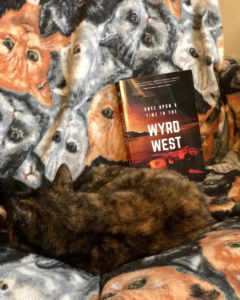
Bird Box by Josh Malerman was in many ways similar to the movie, although the ending is slightly different. Dunno that one has to both read the book and see the movie, unless you really dig understanding the differences between the two forms, in which case it might greatly interest you.
Lies Sleeping by Ben Aaronovitch finished up the terrific Rivers of London urban fantasy police procedural series and I am amore thant a little sad to say goodbye to its fabulous characters, particularly Peter Grant and Leslie.
Niall Slater’s The Second Death of Daedalus Mole is not findable in e-form on the Amazon store, but I read it on my e-reader and no longer remember how I came across it. However, it’s another fun space romp, and recommended.
Charlie Holmberg’s The Plastic Magician is part of the Paper Magician series and is a worthy addition, although it didn’t charm me the way the earlier books did.
While on the road, I binged on some K.J. Charles, which are M/M Regency romances, and read through An Unseen Attraction, An Unnatural Vice, An Unsuitable Heir (I love Pen!), A Gentleman’s Position, A Fashionable Indulgence, and A Seditious Affair.
The Last to See Me by M. Dresser was a subtle and lovely read, one of those books that’s thoroughly speculative yet emphasizing its literary qualities. Some beautiful description, and a slowly unfolding mystery about a modern day ghost resisting the exorcist who’s been summoned to clear her away from the house she haunts.
Queen of the Dark Things by C. Robert Cargill is the sequel to a book I haven’t read but now have to go pick up. The setting is both Austin, Texas and Australia in a nicely done modern fantasy that would have been called horror twenty years ago.
Another nonfiction read, The Myth of Capitalism: Monopolies and the Death of Competition by Jonathan Tepper and Denise Hearn is a sobering read with a lot of relevance to today’s politics and the rule of the kleptocracy. Well written and clearly laid out.
The Wild Dead by Carrie Vaughn is also a sequel where I need to go find the first book. This lovely, understated read reminded me of Kim Stanbley Robinson crossed with Ursula K. Le Guin. Beautifully done.
Baking Powder Wars: The Cutthroat Food Fight that Revolutionized Cooking, by Linda Critello is food history and fascinating, particularly if you ever wondered about the difference between cream of tartar and baking powder.
Superhero Syndrome by Caryn Larringa is the promising start to another superhero series available on Kindle Unlimited, but it’s the only one available still, although it originally appeared in 2017.
Molly Tanzer’s Creatures of Want and Ruin is a solid read, and a follow-up to her Creatures of Will and Temper, though it’s set in Prohibition America while its predecessor was Victorian England. Enjoyable and engaging, it was a great read to finish out the month with.
January 15, 2019
What Does the SFWA President Actually Do?
 My last day is June 30, 2019, wheeeeeee, after which I will have been Vice President of the Science Fiction & Fantasy Writers of America (SFWA) for one year, and President for two two-year terms, adding up to the sum of five consecutive years on the SFWA Board. Thank goodness for term limits.
My last day is June 30, 2019, wheeeeeee, after which I will have been Vice President of the Science Fiction & Fantasy Writers of America (SFWA) for one year, and President for two two-year terms, adding up to the sum of five consecutive years on the SFWA Board. Thank goodness for term limits.
The Elections Committee asked me to do a write-up of what the role involves, which was an interesting exercise in reflection about what all I’ve done over the past time on the Board, and I thought that might be of general interest to the F&SF community at large as well, particularly because SFWA has evolved so rapidly in the past decade, including the admission of indie, small press, and game writers, the implementation of dozens of new initiatives, and the explosive growth of the Nebula Conference Weekend. So here’s an expansion of what I sent our Elections Commissioner Fran Wilde.
The President is one of the major faces of the organization, and should be willing to attend events such as the Nebulas and conventions as well as representing SFWA at the other events they’re present at. (When signing up for conventions, I usually pitch a SFWA meeting and/or “What Can SFWA Do For You?” panel, for example.) As such, they do need to bear in mind that anything they say on social media or in interviews may be taken as having “of SFWA” appended to it, whether or not they want it to. The President carries this more than board members, and needs to remember that the membership may interpret something they say jokingly on Twitter as indicating the overall board’s opinion. Having a disclaimer that your opinions are personal and do not represent the organization on places like social media profiles is vital.
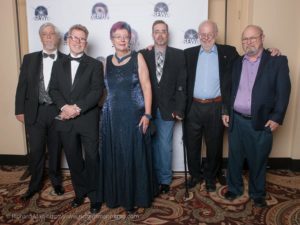
Photo by Richard Man. Left to right: Michael Capobianco, Steven Gould, Cat Rambo, Russell Davis, Greg Bear, Joe Haldeman.
A good President will be familiar with the bylaws and OPPM and work to bulletproof the organization against anyone wishing to do it harm. They must work side-by-side with the board, the Executive Director, the Deputy Executive Director, the financial team, and a slew of volunteers and contractors to make sure that SFWA remains true to its mission while growing and adapting to the evolving and ever-changing publishing landscape.In order to do that, the President needs to keep an eye on what’s going on–which can be difficult at times, given the volunteer nature of the position and the stressors of life. They need to be available to people who need them or arrange someone to cover them when on vacation. But it’s also usually easy to keep up with things and often just a matter of checking in on the discussion boards and e-mail once or twice a day. I do want to note (from experience) that many e-mails are time sensitive and not paying attention can result in holding things up in a frustrating way for other people.

John Scalzi, Cat Rambo. Hawaiian shirts are not mandatory for the President, it only seems that way.
The President also needs to make sure the other Board members also stay on top of things and they work in tandem with the VP to ensure things remain on task. One tradition that’s been implemented are regular weekly video calls with the Executive Director, Deputy Executive Director and SFWA Board. These last 15 minutes to an hour and are pretty low-key. I’m going to miss seeing those friendly faces and getting to compare notes.There is also a monthly call with the Volunteer Wrangler, frequent calls and texts with Griefcom, and sometimes the need to sit in on calls about legal matters when, for example, a scam publisher decides to try to intimidate Writer Beware into removing an advisory about them, which happens every few months. (My policy has been to be very assertive legally in replying to these; SFWA has the funds to defend itself and I want to make it clear to these folks that Writer Beware won’t play their reindeer games.) It should be noted — although it may be obvious by now — that there is a requirement to have Internet access should you decide to run.
The President needs to review the financials in a timely fashion when they are presented to them by the financial team along with the rest of the SFWA Board. Sometimes they will need be able to sign off on decisions with some authority as well as make informed decisions on their own. They have a small discretionary fund; I have used mine on outreach and learning and funding some minor low-cost projects, usually some form of volunteer recognition. I did use a chunk one year to attend a conference on non-profit fundraising, which was fascinating.
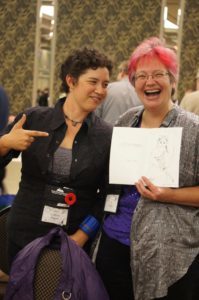
Goldeen Ogawa, Cat Rambo. Photo by Brenda Cooper.
The President needs to provide the membership with regular and thorough information about what’s going on, in the form of reports for the Singularity and Binary, the President’s letter in the Bulletin, and posts on the discussion forums. (I’ve tried to do this for the public as well, with things like my blog series on SFWA and independent writers, a piece I’m working on right now about game writers for a magazine, and even this blog piece.)The President should be willing to attend events such as the Nebulas and conventions as well as representing SFWA at other conventions and conferences. They must attend the various receptions and functions–including the Volunteer Breakfast and Spouse/Partner party at the Nebulas. At conventions and particularly the Nebulas, the President should pretty much figure 90-100% of their waking time will be devoted to SFWA-related stuff and spent networking and engaging the membership, along with leading Board and business meetings, spending time in the SFWA suite or table if there is one, and participating in SFWA-focused programming.
The President must know the organization, its resources, and the frameworks around those resources. There is a constant flurry of people asking for assistance or guidance with communications coming in through a multitude of channels, including telephone, e-mail, and social media, and 90% of the time it’s a matter of steering them to the right place, whether it’s the office, the Emergency Medical Fund, the ombudsman, Griefcom, or something else.
 The President needs to not give into the temptation to Do All the Things, because there will be a constant stream of people bearing all manner of projects, many of them things that really do need to be done. Therefore the President needs to be someone good at working with or steering people to the Volunteer Coordinator to find roles for volunteers that will be rewarding for both sides as well as working with the Volunteer Coordinator to make sure volunteers are getting recognized.
The President needs to not give into the temptation to Do All the Things, because there will be a constant stream of people bearing all manner of projects, many of them things that really do need to be done. Therefore the President needs to be someone good at working with or steering people to the Volunteer Coordinator to find roles for volunteers that will be rewarding for both sides as well as working with the Volunteer Coordinator to make sure volunteers are getting recognized.
The President needs to be a good leader, mindful of the varied needs of the membership, and willing to put energy into learning in order to fulfill the organization’s needs as well as occasionally set the organization above their own interests and/or ego. Patience is important; kindness is vital. It is one of the most rewarding — and occasionally the most frustrating — roles I have filled in my life and I am deeply grateful for the opportunity to have done it.
Will I come back? Not anytime in the next few years, but I will continue to do volunteer work with the organization. =) However, I’ve been putting my own writing on the backburner a bit while doing this, so I’m looking forward to putting that back into my work. Look for lots of new words in 2019, including a new Tabat book, at least one collection, more on the space opera series, and the launch of a self-pub effort I’m excited about!
sfwapro #sfwapro
January 10, 2019
Where I’ll Be: Storming the Confusion, 2019
Seattle, coming home one night
ConFusion will always have a very special place in my heart because it was the first convention to invite me as a Guest of Honor. Michigan in January may be chilly, but I can count on a warm reception there with some awesome people whose company I enjoy, and a con full of memorable moments. This will be my first time back in a long time, but I’m looking forward to the convention, which is always dense with both writers and friends. I started to list names of people I was looking forward to seeing, but there are too many of them. I’ll just say LOTS.Thursday – GoH Dinner
Friday
3 PM, Erie A Pro Writer’s Guide To Consultants
Cat Rambo (M), Richard Shealy, Dan Stout, Michael R. Underwood, Dan Wells
There are a wealth of consulting services available to professional writers these days, including paid editing, sensitivity reading, marketing and social media consulting, and career coaching. What can these consulting services offer to trad and indie authors? When are they a good investment, and how do you vet and choose providers?
Saturday
Booked for Breakfast
10 AM, Ontario The Trouble With Susan (and Donna, and…)
Marissa Lingen (M), Navah Wolfe, Karen Osborne, K. Lynne O’Connor, Cat Rambo
Many beloved genre stories don’t treat their female characters well. Our genre is full of stories that punish female heroes with debasement and tragedy and unhappy endings, either implying or stating outright that the heroines with whom we identify were too ambitious for their own good. How do we reconcile our love for these stories and characters with the poison pills that come with them? Can we keep loving stories that don’t love us back?
1 PM, Erie What Computer Programming Can Teach Us About Writing
Annalee Flower Horne (M), Pablo Defendini, Jennifer Mace, John Chu, Cat Rambo
Writing code and writing fiction may not seem to have a lot in common at the sentence level, but writers and programmers have to manage a lot of the same challenges. Come learn how to apply tools from software development, such as agile development, technical debt management, and code review, to the fiction writing process
3 PM Erie Autograph Session
Meet your favorite authors and get your books signed! Limit 3 items per person, please.
Stop by my table to say hi and get a kittywumpus temporary tattoo!
Ada Palmer, Angus Watson, Anthony W. Eichenlaub, Cat Rambo, Diana Rowland, Dyrk Ashton, Jason Sanford, Joe R. Lansdale, Josef Matulich, Keith Hughes, Lucy A. Snyder, Mackenzie Flohr, Mark Oshiro, Michael R. Underwood, Mur Lafferty, Stacey Filak, Tracy Townsend
Sunday
9 AM Patreon supporter and student breakfast; mail Cat for details
12 PM, Rotunda, Reading: Cat Rambo, Lawrence M. Schoen, Jeffrey Chapman
1 PM Allen Park, The Evolution of Fandom
Jackie Morgan (M), Brian Bay, Cat Rambo, Julie Winningham, Patrick Nielsen Hayden
The only thing that stays the same in fandom is that it continues to change! How has it changed for the better, and how do we think it will continue to change?
January 9, 2019
For Writers: 5 Quick Ways to Increase Your Blog’s Discoverability
 Writers get told they must blog, but not a lot of advice about it. I’ve talked about this more than once, most notably in Do Writers Need to Blog? No. and How to Blog Without Really Trying But Still Managing Not to Be Half-Assed About It. But another thing to consider beyond the content you’re producing is whether or not your readers are finding it.
Writers get told they must blog, but not a lot of advice about it. I’ve talked about this more than once, most notably in Do Writers Need to Blog? No. and How to Blog Without Really Trying But Still Managing Not to Be Half-Assed About It. But another thing to consider beyond the content you’re producing is whether or not your readers are finding it.
If you have a blog, take a moment and type your name into a search engine. If your blog doesn’t appear on the first page of results, you have a problem. The further down the page it is, the harder it is for a reader to find it. Type ‘Cat Rambo’ in and you should see this blog on the top of the list, along with other links that go to me rather than that taxi driver with a cat named Rambo who drives around with his cat in the backseat or the Cat Rambo featured in an article about underwater pumpkin carving.
So — if you’re not on that first page –how do you remedy that? Here’s five ways to make your blog more effective by making it more discoverable when people come looking for you.
Check your front page. Does it include the name you write under? Not just your first name, not a cute pseudonym. And not contained in an image rather than text. If not, please add it.
Make titles meaningful. A title should give a reader a reason to read, often to answer a question that the title has raised. For example: what are the five quick ways I could make my blog more discoverable? rather than “Check this out” or “Here’s something startling.”
Use images. Visual content makes a post more engaging and it provides something when people are sharing it on social media. Visual content gets shared more often than text-only. And a post lacking an image may not be pinnable on Pinterest, which is a valid social media site for authors.
Look at your site on your phone. Google Analytics tells me over half my traffic is readers using their phone to read it; it would be foolish for me not to make it as readable as possible for them. What’s not appearing? What looks weird? Menus that look great on a computer screen and are easy to select and click with a mouse are often much more difficult to navigate on a phone’s smaller touch screen.
Use what’s available. Tags and categories are both tools that search engines incorporate when creating rankings and they make things more discoverable for your readers. The Related Posts plug-in that I use on this blog depends on tags in order to find and display similar content that may intrigue readers of a particular post.
Bonus tip: Link to other posts. Internal links can help your reader find relevant content without leading them away from your site, and they also favorably influence search engines. You might even create pages that consolidate information, like this page of Resources for F&SF Writers. Look at this page — I can count five different ways I’ve done this. Can you find them all?
January 8, 2019
Guest Post: Terry Gene Speaks Of Breaking Hips and Rules, or Paradise Found in INTJ Land
 A teen armed with only a leaking space-corps-surplus spacesuit and Socrates’ logic defeats the Intergalactic Deep State and saves Earth’s civilizations.
A teen armed with only a leaking space-corps-surplus spacesuit and Socrates’ logic defeats the Intergalactic Deep State and saves Earth’s civilizations.
How cool is that?
Every summer my father hitched the twelve-foot camp trailer and drove us to a trailer camp on the Long Beach Peninsula in Washington. There we clammed the AM low tide (sometimes in the dark) and fished the PM tide change. The remaining twenty-two hours, the parental units slept or traded mild exaggerations with their cohort. Blue collar heaven, childhood purgatory.
At the age of ten, Long Beach was too far to walk, so we entertained ourselves by examining mildew in the communal showers, finding how deep dune grass roots went, and discovering the Literary Pirate, a fifteen by ten-foot building stacked to the ceiling with used books. The used books opened the mysterious adult worlds of character, story, and gasp, theme. Each year I challenged myself to understand more and more adult books. Sartre’s No Exit evaded my understanding until I was fourteen. I discovered that reading was FUN. Not that I knew it then. All I knew was that I wasn’t falling asleep.
This was when I started writing, covertly. What writing was acceptable was narrowly defined in school. This carried through High School and into College where sideways comments about imagination coupled with discouragement about pursuing my writing.
Hold for a moment… I have to slap myself from riffing on Bucky Fuller (1) and how formal education destroys…thank you. I feel better now.
A long story short, I became an Engineer, where having someone else to do the writing is valued. To be honest, the thirty-plus technical, NGO and government papers were mostly written to get my company to pay for junkets to exotic locations.
Then my wife’s hip broke.
She’s a patient bed-bound patient, but as the sole caretaker, this kept me at home for eight weeks. There are only so many times you can steam clean the floors before you start thinking… and writing.
This initiated my second childhood, but this time I’m the playground monitor. An INTJ playground monitor. On the path to publishing my first book, shameless plug below, I broke rules I didn’t know existed. Hopefully, my conclusions below will help.
Writing what matters.
Let’s take the kid-in-spacesuit story blurbed above. I internalized something from that book–diversity. Not as practiced in children’s books, slavishly measuring hue of melanin, the angle of eyebrows, or thickness of lips. What the Inter-Galactic Deep State couldn’t handle was different ways of thinking. This diversity of thought was seen as the root cause of conflict and needed eradication before it spread off the planet.
Thus inspired, my first fiction writing attempts were pedantic and read like something from a vade mecum. Amusing in places but with long stretches of ‘meaning.’ Zzzz. My writing still suffers from this tendency.
Decades later, I read interviews with the author. He purposely avoided hitting the reader between the eyes with the need to think. (Well, he did have a thing with militarism, but that is another discussion.) Instead, he wrote to entertain. He knew that those open to subversive notions such as diversity of thought would internalize it.
During the same period Fahrenheit 451 was written. While masterfully written in the MFA sense, it is a wall-to-wall polemic. However, it remains a great read.
Lesson learned. Write to be entertaining, and trust open-thinking readers will discover the theme.
The Write way to Right.
By now, you have been exposed to exhortations on how to write. According to these people, if you don’t do it in a specific way, you will never create anything good. Some, like James Patterson, soften it with ‘in a decent amount of time.’ Here is my experience in this.
In my first novel, I kept on getting lost as to who was where, when, and doing what. I created a master 55-day calendar and color-coded it with both plot strings and characters. Also, I enthusiastically joined group write-ins for the energy.(2) These all worked for me.
In my second novel, the count-down clock was still there but covered fourteen months. A calendar had too many empty weeks. I went to outlining, aka plotting, using the complicated but comprehensive Gold outline. (3) This helped me navigate the increasingly subtle and convoluted motivations of the main and secondary characters that evolve over those fourteen months. The matrix in 9 point print fills two 20×30 inch poster boards. I quit the write-ins as they did nothing for me. Instead, I sat in the elevated tables opposite the McDonald’s counter, especially during the height of Happy Meal time. The screeches and chirps of (mostly) happy children counter-pointed my somber mood.
Third novel needed to wrap up major character arcs and finally answer the question ‘What is really going on.’ The previous methods didn’t work, so I went to bubble charting and power lines. This is sometimes referred to as mind-mapping. When I couldn’t work in significant other’s She Shed, I repaired to the public library which turned over their swing office space. I wrote them into the acknowledgment.
The fourth novel was for fun, but needed to answer ‘Why did all this happen?’ This was the most complex, so I sketched on one sheet of paper the major plot and character points, wrote a one-page final chapter and quasi-outlined the first twenty-thousand pages. As I got to the end of each outline, I prep-ed another one. This is known affectionately and derisively in Project Management as the ‘rolling wave.’ My spousal-unit had had enough my use of her she shed, so she kicked me upstairs into a closet painted bright yellow.
Does that answer the question of how and where to write a novel? The answer is: whatever works for you.
Benefiting from Criticism.
“There are only two genetic imperatives: procreation and correcting someone else’s writing.” Not original, just another modern philosopher, Bill Lucky. (4) In professional circles, there is no shortage of people willing to critique your work. Some channel the Lucky principle, others are hungry for new ideas, and some for diversion from their work. I also had editors working in parallel, because that level of criticism energized my solution-creating.
Criticism is critical to your growth. Getting actionable criticism gives you the edge in clarity, speed, and expanded readership. I won’t say that it’s necessarily easy on your ego. With that in mind, some of the things I’ve concluded are:
Your least useful feedback is the positive “I love it,” or “I want to read more.” After the glow, how did your writing improve? Do you succumb to “confirmation bias?” I’ve left several local and online critique groups that didn’t know how to dig down.
Second least useful feedback is a blanket negative, typically hidden in flowery words. If you can’t find actionable meat, never send your work to that person. There is a special hell for any paid editor who creates non-actionable reviews.
Your most useful feedback comes from Nellie Negative. The more detailed, the better. This is a gold mine. Here are some nuggets to mine.
What has the reviewer published? Read it. (5) Understand how you differ. Answer the question, is the reviewer a reader of your type of fiction? Adjust your writing to exploit the insight.
Look for nuggets of severe unhappiness. What does each comment say about how your scene is perceived? What craft approach would fix it?
Look for passion. Are the offending sentences or scene needed? Do they add or detract from what you are trying to do?
Marginal feedback comes in several forms. These are the comments that are utterly irrelevant in the draft stage or are written for another agenda.
First are Lilly -LY, Passive Count, Queen Comma, and the Barron of That. Sometimes a draft sentence needs grammar, punctuation, or spelling corrected to prevent confusion. Granting that exception, deleting -ly words (a poor surrogate for really understanding adverbs), occurrences of that, passive words, and alternating between Oxford and common comma use is a waste of time. Until you get to the copy edit stage, most if none of these corrections will survive the revision process.
Padded Palaver is the next waster of your time. PP frequents otherwise excellent on-line critique groups. These groups feel the need to rank order critiquers. You get what you reward. Unfortunately, the most common metric rewards gold stars for quantity, not quality. A two-thousand-word critique is never better than one with four hundred considered and actionable words.
These days, a comment about PC, politically correct, is needed. When you get these comments, search your soul, their motivations, and research, research, research. PC-motivated comments from people who never lived the reality are rarely useful. As an example, until my last move, , I was an elder-elect of an eighty-percent black church. To set characters, I’ve used the dialect of people I know. As an example, a First Ward Newark person is distinct to my ears than one whose parents more recently joined the mass migration from the south to the northern heavy industries. When someone had conniption fits, I sent the offending chapter to my previous congregation. The only complaints I’ve received is about white-washing.
Lesson learned. Actively seek out sources of criticism. Encourage negative criticism as long as it is specific and actionable. Don’t be afraid of questioning yourself and ask for help from people with direct, non-academic insight.
A beta and edit we will go.
Having someone read and comment on an entire manuscript is invaluable. You need brutal but actionable comments.
The first thing you do is turn on both the grammar and spelling checker, and revise the manuscript. This cleans up the most obvious ninety percent of errors that you miss. The reason is simple. Why tie up a reviewer with the simple? I would recommend that you next try out Autocrit, Grammarly, and/or Hemmingway. A shout out on Grammarly and Hemmingway. Do NOT slavishly follow the suggestions. Both flatten your and your character’s voice. Internalize what ‘non-normative’ word/phrase usages you and your characters use and trust yourself.
There is also the amusing thing that Grammarly does with commas and other grammar. The first pass, it removes commas en masse. The second pass, it replaces them. In my last manuscript, there are 400 ‘errors’ that never got resolved. I decided on a ‘standard’ to remain consistent. Anyone with a checkbook is free to tell me what the real answer is.
If the reviewer is unpaid, except via trade in kind, e.g., manuscript exchanges, or a point system, then they are Beta Readers. A beta read is a partnership. Search out fellow travelers where ever they hang. Once you find a genre-compatible beta reader question is if you can stand each other. It’s like being married.
Editing is when you pay for the review. In my technical papers, I typically have had multiple parallel editors. I integrated them on the fly. I’ve tried this in fiction, and, well, I don’t recommend it.
The big reveals from my many editors are:
The flashier their website, and the flowerier (is that a word?) the testimonials, the more useless the editor.
The actionability of the edit toward forging a readable final draft seems to be in inverse to the cost. I once paid $7000 to an editor with lavish testimonials to get a seven-page editorial assessment that read like a Middle School essay, larded with about 55% repetition. There was no apparent taxonomy, just repetition. The line edits thinned out starting at the one-third point and stopped at the halfway mark.
None of the bad editors ever gave me a clear answer to: Who have you edited? Which books? What type of editing did you do on each book? May I have their contact information?
The best editors seem to cluster in price around the latest report by the Editorial Freelancers Association, https://www.the-efa.org/. Bookmark this. Too much lower, and definitely noticeably higher have been warning signs that I’ve ignored and regretted.
You need edits that are brutal, but actionable. One without the other is a sign of a bad editor.
GENRE MATTERS. With apologies to all my MA.Eng and MFA friends out there, you don’t want a paid editor who gets apoplectic over a genre meme or trope that has been used since the ‘50s. Or worse, misses how it affects the next three chapters, so the edits are useless.
My takeaway is my best editors have been deep into the genre, AND gladly provided explicit references.
One-inch margins are (not) (not) the gate to legitimacy.
Via rejection by a local critique group, I was introduced to the ‘proper manuscript format’ as the correct and only way to submit to agents and editors.
I thought I was being punked.
That method of manuscript formatting was abandoned in professional and technical journals in the ‘70s. (6) The military followed the mid-80s when Natick Labs proved that type of document formatting increased errors in maintenance 10 – 20%.
I now have an MSWord template that incorporates the standard format, or more accurately a central path between the dozens of ‘standard formats’ out there. I send it to people who are floundering with rejection having nothing to do with their writing.
A side note. Of the over 200 agents and editors I’ve queried, all but three wanted the pages pasted into the e-mail. So much for the standard manuscript format. But I still comply. My energy focusses on my writing.
Conclusion. Arguing about formatting is a waste of time. Put your energy into excellent revisions.
What agents and editors should tell you and never do.
A year into writing, I wanted to accelerate my skill acquisition. For an INTJ, this is a no-brainer. In my engineering and project management days, I’ve used ‘resident’ training many times. If I hadn’t, I won’t have seen one of the violent UCLA riots. I did miss a Berkeley smashed-windows-protesting-the-moderate-speaker when the one-week residential program was moved to a Ramada.
I cleaned up a sample short story and leveraged it into acceptance in a two-week mountain retreat writing workshop ready to pump up my writing muscles.
There, I discovered THE QUESTION that would dog me for the next four years, During the personal consultation with one of the faculty, a two-hundred-book Sci-Fi/Fantasy author, I asked, “What is my subgenre? Also, who writes in the subgenre?”
Unfortunately, I didn’t understand the significance of his response. “It’s definitely Sci-Fi. We (the faculty) don’t know what sub-genre to put it in.”
Flash forward four years. By then, I’d found, read, and loved several comparable novels, aka “comps,” but they are decades old. I needed contemporary books to study and adjust my work. So I asked a Harper Collins acquisition editor. She said, “My predecessor would have looked at your novel in the hopes of re-igniting the sub-genre. Unfortunately, all the majors have inventories of these books that we’ll never publish until someone else has the breakout novel.”
I can work with that—remember I’m an INTJ. Rejection only points to opportunities. For me, all mental barriers to indie publishing vaporized. However, it was just because we’d wrapped the pitch up in two minutes and had eight minutes to kill that I found out the truth.
My new solution freed up hundreds of future hours reading the muddy bottoms of teacups, aka querying. Instead, I invested in four courses on the nuts and bolts of the modern printing process. My first paperback went public as I write this.
Conclusion: Agents and Editors won’t tell you unless cornered, WHY your work isn’t what they consider to be commercial. But didn’t a story about children waving sticks and mangling pseudo-Latin have the same assessment?
Violating rules and gates.
As you may have noticed, I’m not a fan of rules imposed by gatekeepers. Consent of the governed, and all that. Rules imposed by gatekeepers reflect their needs first. On the other side, violating rules takes energy, especially when you don’t understand why you are getting pushback. This INTJ wasted a lot of time, before conceding that most rules are harmless, and moved on.
Note that I never say, ‘fix your theme or voice.’ With craft maturity, you should be able to present any concept, but only to the degree that it is understandable and entertaining. Being able to write stories outside of the PC mainstream while holding reader is my highest craft goal.
Your mileage will vary.
Notes.
Bucky Fuller, the author of several books masquerading as technical tomes, is in reality, one of the great philosophers of the modern era. A few quotes:
“If I ran a school, I’d give the average grade to the ones who gave me all the right answers, for being good parrots. I’d give the top grades to those who made a lot of mistakes and told me about them, and then told me what they learned from them.”
“Mistakes are great, the more I make, the smarter I get.”
“When I am working on a problem, I never think about beauty, but when I have finished, if the solution is not beautiful, I know it is wrong.”
“There are no geniuses, merely those who defied damage by the school orthodoxy.”
Find these by cruising facebook groups, meetup.com, and nanowrimo.org
https://jamigold.com/for-writers/worksheets-for-writers/
Go to your Library! Most books are available on-line FREE via Overdrive and other library services. I’ve even placed a dedication in my novel for my local library.
Bill Lucky, a Bell Labs vice president, wrote volumes about how technology is defined by humanity and how humanity is defined by technology. To say an object is evil only states mankind is evil. Obsessing over the object is childish. A few of his essays are collected in the book “Lucky Strikes.” Interestingly, Spinoza said much the same thing over three hundred years earlier.
I pulled my first paper, given at the first International Maintainability Symposia. Okay, I confess, it was in Orlando, and I wanted to see Disney World and Busch Gardens. Even in 1977, none of the accepted papers came close to the manuscript standard mandated for Fiction.
My Matryoschka novel releases 23 November. Until then, discounted pre-orders are available worldwide and via library distributors Baker and Tayler, Overdrive, and Biblio.
This URL: https://t2m.io/l3Rkk5fj will get you to your preferred bookseller, anywhere in the world you live.
Terry Gene, author, terry.gene@syzygy.org,
https://matryoschka.com; https://amazon.com/author/terrygene
On social media as “terry gene author” medium.com, facebook, twitter, Instagram, Pinterest.
If you’re an author or other fantasy and science fiction creative, and want to do a guest blog post, please check out the guest blog post guidelines.
Guest Post: Terry Gene Speaks Of Breaking Hips and Rules, or Paradise Found in INTP Land
 A teen armed with only a leaking space-corps-surplus spacesuit and Socrates’ logic defeats the Intergalactic Deep State and saves Earth’s civilizations.
A teen armed with only a leaking space-corps-surplus spacesuit and Socrates’ logic defeats the Intergalactic Deep State and saves Earth’s civilizations.
How cool is that?
Every summer my father hitched the twelve-foot camp trailer and drove us to a trailer camp on the Long Beach Peninsula in Washington. There we clammed the AM low tide (sometimes in the dark) and fished the PM tide change. The remaining twenty-two hours, the parental units slept or traded mild exaggerations with their cohort. Blue collar heaven, childhood purgatory.
At the age of ten, Long Beach was too far to walk, so we entertained ourselves by examining mildew in the communal showers, finding how deep dune grass roots went, and discovering the Literary Pirate, a fifteen by ten-foot building stacked to the ceiling with used books. The used books opened the mysterious adult worlds of character, story, and gasp, theme. Each year I challenged myself to understand more and more adult books. Sartre’s No Exit evaded my understanding until I was fourteen. I discovered that reading was FUN. Not that I knew it then. All I knew was that I wasn’t falling asleep.
This was when I started writing, covertly. What writing was acceptable was narrowly defined in school. This carried through High School and into College where sideways comments about imagination coupled with discouragement about pursuing my writing.
Hold for a moment… I have to slap myself from riffing on Bucky Fuller (1) and how formal education destroys…thank you. I feel better now.
A long story short, I became an Engineer, where having someone else to do the writing is valued. To be honest, the thirty-plus technical, NGO and government papers were mostly written to get my company to pay for junkets to exotic locations.
Then my wife’s hip broke.
She’s a patient bed-bound patient, but as the sole caretaker, this kept me at home for eight weeks. There are only so many times you can steam clean the floors before you start thinking… and writing.
This initiated my second childhood, but this time I’m the playground monitor. An INTP playground monitor. On the path to publishing my first book, shameless plug below, I broke rules I didn’t know existed. Hopefully, my conclusions below will help.
Writing what matters.
Let’s take the kid-in-spacesuit story blurbed above. I internalized something from that book–diversity. Not as practiced in children’s books, slavishly measuring hue of melanin, the angle of eyebrows, or thickness of lips. What the Inter-Galactic Deep State couldn’t handle was different ways of thinking. This diversity of thought was seen as the root cause of conflict and needed eradication before it spread off the planet.
Thus inspired, my first fiction writing attempts were pedantic and read like something from a vade mecum. Amusing in places but with long stretches of ‘meaning.’ Zzzz. My writing still suffers from this tendency.
Decades later, I read interviews with the author. He purposely avoided hitting the reader between the eyes with the need to think. (Well, he did have a thing with militarism, but that is another discussion.) Instead, he wrote to entertain. He knew that those open to subversive notions such as diversity of thought would internalize it.
During the same period Fahrenheit 451 was written. While masterfully written in the MFA sense, it is a wall-to-wall polemic. However, it remains a great read.
Lesson learned. Write to be entertaining, and trust open-thinking readers will discover the theme.
The Write way to Right.
By now, you have been exposed to exhortations on how to write. According to these people, if you don’t do it in a specific way, you will never create anything good. Some, like James Patterson, soften it with ‘in a decent amount of time.’ Here is my experience in this.
In my first novel, I kept on getting lost as to who was where, when, and doing what. I created a master 55-day calendar and color-coded it with both plot strings and characters. Also, I enthusiastically joined group write-ins for the energy.(2) These all worked for me.
In my second novel, the count-down clock was still there but covered fourteen months. A calendar had too many empty weeks. I went to outlining, aka plotting, using the complicated but comprehensive Gold outline. (3) This helped me navigate the increasingly subtle and convoluted motivations of the main and secondary characters that evolve over those fourteen months. The matrix in 9 point print fills two 20×30 inch poster boards. I quit the write-ins as they did nothing for me. Instead, I sat in the elevated tables opposite the McDonald’s counter, especially during the height of Happy Meal time. The screeches and chirps of (mostly) happy children counter-pointed my somber mood.
Third novel needed to wrap up major character arcs and finally answer the question ‘What is really going on.’ The previous methods didn’t work, so I went to bubble charting and power lines. This is sometimes referred to as mind-mapping. When I couldn’t work in significant other’s She Shed, I repaired to the public library which turned over their swing office space. I wrote them into the acknowledgment.
The fourth novel was for fun, but needed to answer ‘Why did all this happen?’ This was the most complex, so I sketched on one sheet of paper the major plot and character points, wrote a one-page final chapter and quasi-outlined the first twenty-thousand pages. As I got to the end of each outline, I prep-ed another one. This is known affectionately and derisively in Project Management as the ‘rolling wave.’ My spousal-unit had had enough my use of her she shed, so she kicked me upstairs into a closet painted bright yellow.
Does that answer the question of how and where to write a novel? The answer is: whatever works for you.
Benefiting from Criticism.
“There are only two genetic imperatives: procreation and correcting someone else’s writing.” Not original, just another modern philosopher, Bill Lucky. (4) In professional circles, there is no shortage of people willing to critique your work. Some channel the Lucky principle, others are hungry for new ideas, and some for diversion from their work. I also had editors working in parallel, because that level of criticism energized my solution-creating.
Criticism is critical to your growth. Getting actionable criticism gives you the edge in clarity, speed, and expanded readership. I won’t say that it’s necessarily easy on your ego. With that in mind, some of the things I’ve concluded are:
Your least useful feedback is the positive “I love it,” or “I want to read more.” After the glow, how did your writing improve? Do you succumb to “confirmation bias?” I’ve left several local and online critique groups that didn’t know how to dig down.
Second least useful feedback is a blanket negative, typically hidden in flowery words. If you can’t find actionable meat, never send your work to that person. There is a special hell for any paid editor who creates non-actionable reviews.
Your most useful feedback comes from Nellie Negative. The more detailed, the better. This is a gold mine. Here are some nuggets to mine.
What has the reviewer published? Read it. (5) Understand how you differ. Answer the question, is the reviewer a reader of your type of fiction? Adjust your writing to exploit the insight.
Look for nuggets of severe unhappiness. What does each comment say about how your scene is perceived? What craft approach would fix it?
Look for passion. Are the offending sentences or scene needed? Do they add or detract from what you are trying to do?
Marginal feedback comes in several forms. These are the comments that are utterly irrelevant in the draft stage or are written for another agenda.
First are Lilly -LY, Passive Count, Queen Comma, and the Barron of That. Sometimes a draft sentence needs grammar, punctuation, or spelling corrected to prevent confusion. Granting that exception, deleting -ly words (a poor surrogate for really understanding adverbs), occurrences of that, passive words, and alternating between Oxford and common comma use is a waste of time. Until you get to the copy edit stage, most if none of these corrections will survive the revision process.
Padded Palaver is the next waster of your time. PP frequents otherwise excellent on-line critique groups. These groups feel the need to rank order critiquers. You get what you reward. Unfortunately, the most common metric rewards gold stars for quantity, not quality. A two-thousand-word critique is never better than one with four hundred considered and actionable words.
These days, a comment about PC, politically correct, is needed. When you get these comments, search your soul, their motivations, and research, research, research. PC-motivated comments from people who never lived the reality are rarely useful. As an example, until my last move, , I was an elder-elect of an eighty-percent black church. To set characters, I’ve used the dialect of people I know. As an example, a First Ward Newark person is distinct to my ears than one whose parents more recently joined the mass migration from the south to the northern heavy industries. When someone had conniption fits, I sent the offending chapter to my previous congregation. The only complaints I’ve received is about white-washing.
Lesson learned. Actively seek out sources of criticism. Encourage negative criticism as long as it is specific and actionable. Don’t be afraid of questioning yourself and ask for help from people with direct, non-academic insight.
A beta and edit we will go.
Having someone read and comment on an entire manuscript is invaluable. You need brutal but actionable comments.
The first thing you do is turn on both the grammar and spelling checker, and revise the manuscript. This cleans up the most obvious ninety percent of errors that you miss. The reason is simple. Why tie up a reviewer with the simple? I would recommend that you next try out Autocrit, Grammarly, and/or Hemmingway. A shout out on Grammarly and Hemmingway. Do NOT slavishly follow the suggestions. Both flatten your and your character’s voice. Internalize what ‘non-normative’ word/phrase usages you and your characters use and trust yourself.
There is also the amusing thing that Grammarly does with commas and other grammar. The first pass, it removes commas en masse. The second pass, it replaces them. In my last manuscript, there are 400 ‘errors’ that never got resolved. I decided on a ‘standard’ to remain consistent. Anyone with a checkbook is free to tell me what the real answer is.
If the reviewer is unpaid, except via trade in kind, e.g., manuscript exchanges, or a point system, then they are Beta Readers. A beta read is a partnership. Search out fellow travelers where ever they hang. Once you find a genre-compatible beta reader question is if you can stand each other. It’s like being married.
Editing is when you pay for the review. In my technical papers, I typically have had multiple parallel editors. I integrated them on the fly. I’ve tried this in fiction, and, well, I don’t recommend it.
The big reveals from my many editors are:
The flashier their website, and the flowerier (is that a word?) the testimonials, the more useless the editor.
The actionability of the edit toward forging a readable final draft seems to be in inverse to the cost. I once paid $7000 to an editor with lavish testimonials to get a seven-page editorial assessment that read like a Middle School essay, larded with about 55% repetition. There was no apparent taxonomy, just repetition. The line edits thinned out starting at the one-third point and stopped at the halfway mark.
None of the bad editors ever gave me a clear answer to: Who have you edited? Which books? What type of editing did you do on each book? May I have their contact information?
The best editors seem to cluster in price around the latest report by the Editorial Freelancers Association, https://www.the-efa.org/. Bookmark this. Too much lower, and definitely noticeably higher have been warning signs that I’ve ignored and regretted.
You need edits that are brutal, but actionable. One without the other is a sign of a bad editor.
GENRE MATTERS. With apologies to all my MA.Eng and MFA friends out there, you don’t want a paid editor who gets apoplectic over a genre meme or trope that has been used since the ‘50s. Or worse, misses how it affects the next three chapters, so the edits are useless.
My takeaway is my best editors have been deep into the genre, AND gladly provided explicit references.
One-inch margins are (not) (not) the gate to legitimacy.
Via rejection by a local critique group, I was introduced to the ‘proper manuscript format’ as the correct and only way to submit to agents and editors.
I thought I was being punked.
That method of manuscript formatting was abandoned in professional and technical journals in the ‘70s. (6) The military followed the mid-80s when Natick Labs proved that type of document formatting increased errors in maintenance 10 – 20%.
I now have an MSWord template that incorporates the standard format, or more accurately a central path between the dozens of ‘standard formats’ out there. I send it to people who are floundering with rejection having nothing to do with their writing.
A side note. Of the over 200 agents and editors I’ve queried, all but three wanted the pages pasted into the e-mail. So much for the standard manuscript format. But I still comply. My energy focusses on my writing.
Conclusion. Arguing about formatting is a waste of time. Put your energy into excellent revisions.
What agents and editors should tell you and never do.
A year into writing, I wanted to accelerate my skill acquisition. For an INTP, this is a no-brainer. In my engineering and project management days, I’ve used ‘resident’ training many times. If I hadn’t, I won’t have seen one of the violent UCLA riots. I did miss a Berkeley smashed-windows-protesting-the-moderate-speaker when the one-week residential program was moved to a Ramada.
I cleaned up a sample short story and leveraged it into acceptance in a two-week mountain retreat writing workshop ready to pump up my writing muscles.
There, I discovered THE QUESTION that would dog me for the next four years, During the personal consultation with one of the faculty, a two-hundred-book Sci-Fi/Fantasy author, I asked, “What is my subgenre? Also, who writes in the subgenre?”
Unfortunately, I didn’t understand the significance of his response. “It’s definitely Sci-Fi. We (the faculty) don’t know what sub-genre to put it in.”
Flash forward four years. By then, I’d found, read, and loved several comparable novels, aka “comps,” but they are decades old. I needed contemporary books to study and adjust my work. So I asked a Harper Collins acquisition editor. She said, “My predecessor would have looked at your novel in the hopes of re-igniting the sub-genre. Unfortunately, all the majors have inventories of these books that we’ll never publish until someone else has the breakout novel.”
I can work with that—remember I’m an INTP. Rejection only points to opportunities. For me, all mental barriers to indie publishing vaporized. However, it was just because we’d wrapped the pitch up in two minutes and had eight minutes to kill that I found out the truth.
My new solution freed up hundreds of future hours reading the muddy bottoms of teacups, aka querying. Instead, I invested in four courses on the nuts and bolts of the modern printing process. My first paperback went public as I write this.
Conclusion: Agents and Editors won’t tell you unless cornered, WHY your work isn’t what they consider to be commercial. But didn’t a story about children waving sticks and mangling pseudo-Latin have the same assessment?
Violating rules and gates.
As you may have noticed, I’m not a fan of rules imposed by gatekeepers. Consent of the governed, and all that. Rules imposed by gatekeepers reflect their needs first. On the other side, violating rules takes energy, especially when you don’t understand why you are getting pushback. This INTP wasted a lot of time, before conceding that most rules are harmless, and moved on.
Note that I never say, ‘fix your theme or voice.’ With craft maturity, you should be able to present any concept, but only to the degree that it is understandable and entertaining. Being able to write stories outside of the PC mainstream while holding reader is my highest craft goal.
Your mileage will vary.
Notes.
Bucky Fuller, the author of several books masquerading as technical tomes, is in reality, one of the great philosophers of the modern era. A few quotes:
“If I ran a school, I’d give the average grade to the ones who gave me all the right answers, for being good parrots. I’d give the top grades to those who made a lot of mistakes and told me about them, and then told me what they learned from them.”
“Mistakes are great, the more I make, the smarter I get.”
“When I am working on a problem, I never think about beauty, but when I have finished, if the solution is not beautiful, I know it is wrong.”
“There are no geniuses, merely those who defied damage by the school orthodoxy.”
Find these by cruising facebook groups, meetup.com, and nanowrimo.org
https://jamigold.com/for-writers/worksheets-for-writers/
Go to your Library! Most books are available on-line FREE via Overdrive and other library services. I’ve even placed a dedication in my novel for my local library.
Bill Lucky, a Bell Labs vice president, wrote volumes about how technology is defined by humanity and how humanity is defined by technology. To say an object is evil only states mankind is evil. Obsessing over the object is childish. A few of his essays are collected in the book “Lucky Strikes.” Interestingly, Spinoza said much the same thing over three hundred years earlier.
I pulled my first paper, given at the first International Maintainability Symposia. Okay, I confess, it was in Orlando, and I wanted to see Disney World and Busch Gardens. Even in 1977, none of the accepted papers came close to the manuscript standard mandated for Fiction.
My Matryoschka novel releases 23 November. Until then, discounted pre-orders are available worldwide and via library distributors Baker and Tayler, Overdrive, and Biblio.
This URL: https://t2m.io/l3Rkk5fj will get you to your preferred bookseller, anywhere in the world you live.
Terry Gene, author, terry.gene@syzygy.org,
https://matryoschka.com; https://amazon.com/author/terrygene
On social media as “terry gene author” medium.com, facebook, twitter, Instagram, Pinterest.
If you’re an author or other fantasy and science fiction creative, and want to do a guest blog post, please check out the guest blog post guidelines.






